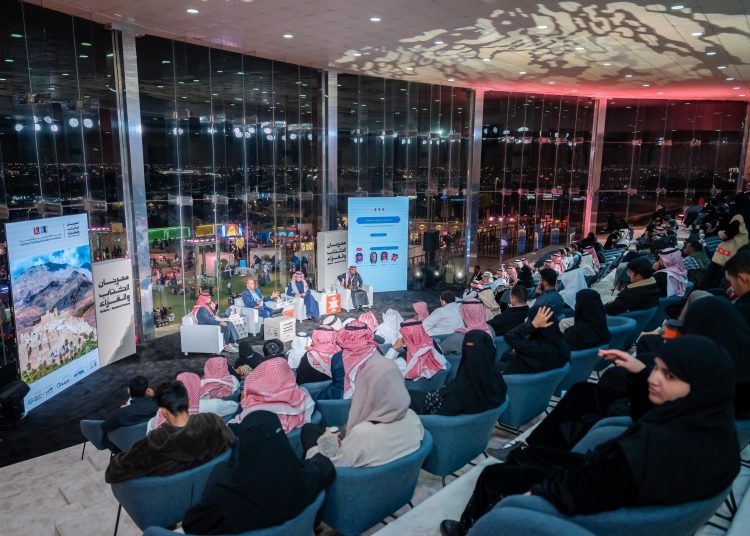Khamis Mushait City – Asir Region, Saudi Arabia :
Documenting myths and folktales is a crucial aspect of both Arab and global literature. A cultural festival in Saudi Arabia recently spotlighted this area, hosting a panel discussion that advocated for the preservation of these stories. The focus was on ensuring that these age-old tales are not lost to time, but rather passed down from generation to generation.
This topic was explored in a panel session about the influence of myths and folktales in shaping collective cultural consciousness through literature. This discussion was a highlight of the cultural program at the Writers and Readers Festival in Khamis Mushait, Asir Region. The panel featured Dr. Abdullah Ibrahim, a respected thought leader, critic, and academic, along with Asim Al-Tekhais, a renowned screenwriter and novelist, and Ahmad Al-Sarwi, a celebrated writer and theater director. The session was skillfully moderated by Mishal Al-Shammari.
During the discussion, Al-Tekhais pointed out the universal nature of myths, noting how different cultures often share similar stories, although under different names. He highlighted how Hollywood has adapted various characters from Arab mythology, such as Robin Hood, originally an Arab figure, along with other iconic characters like Sindbad and Ali Baba. These adaptations show how these ancient Arab tales have been reshaped to fit into Western culture.
He emphasized the need to adapt the language of myths and folktales to ensure their relevance and survival for future generations. This includes modernizing the language, as seen in the adaptations of Shakespeare’s works, where the stories are simplified and characters updated to resonate with contemporary audiences. Innovative storytelling methods such as comics, TV series, films, and video games are also being utilized to keep these tales alive.

Ahmad Al-Sarwi, author and expert in theatrical heritage, delved into the rain myth in his discussion. He analyzed it from a research perspective, noting the common elements shared by various ancient myths, including the famed Epic of Gilgamesh.
Dr. Abdullah Ibrahim, a renowned thinker and academic, shared his extensive engagement with the subject of myths and folktales. He highlighted the importance of oral traditions in Arab and Islamic societies, where experiences and imaginations are passed down orally rather than in written form. He stressed the challenge of preserving these oral memories without confining or altering their essence if transcribed, or risking their disappearance if not documented.
Dr. Ibrahim emphasized the crucial role of narrative tales in shaping a nation’s identity and preserving its collective memory. He pointed out that these stories, cherished by both Arab and non-Arab communities, form the backbone of a nation’s heritage, transcending formalities like constitutions and borders. He explained that while nations inherently absorb these stories, researchers categorize them into three distinct types: myths, fairy tales, and folk stories, each carrying unique characteristics and serving different cultural functions.
He further elaborated that myths, often rooted in ancient religious beliefs, have evolved over time, shedding their ritualistic elements to become more allegorical. Myths typically weave tales of extraordinary events and phenomena, straddling the line between the natural and the supernatural. They tend to symbolize deeper meanings rather than literal histories, resembling the foundational beliefs of societies. Fairy tales, on the other hand, are marked by their implausibility and detachment from reality. These stories transcend cultural boundaries, being told in various locales without being influenced by local cultural nuances.
Dr. Abdullah Ibrahim focused on the significance of folk tales, which resonate deeply with societal emotions and express a community’s collective imagination. These stories, mirroring the local environment and intertwined with societal customs and traditions, offer a window into understanding different cultures. He emphasized that folk tales, in contrast to myths and fairy tales, continuously evolve and adapt to the times, enriching their narrative with the historical context of their origin. He highlighted examples like the epics of Saif ibn Dhi Yazan and Antarah ibn Shaddad, evolving in their publication over centuries. Dr. Ibrahim advocates for preserving these rich folk narratives for future generations, stressing their importance in cultural continuity.
Furthermore, the Writers and Readers Festival, originating in Saudi Arabia, is a testament to the universal value of culture, extending its influence globally. This event significantly contributes to the cultural scene, allowing audiences to explore a diverse range of literary experiences. It celebrates both local and international authors, acknowledging their crucial role in shaping human cultural and civilizational output. The festival provides an inspiring and knowledge-rich experience, accommodating all societal segments, and features events that blend literature with interactive and entertaining elements.






Discussion about this post